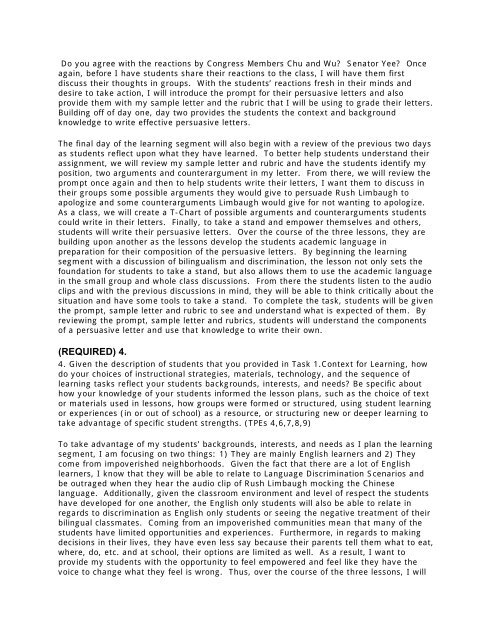Example 1
Example 1
Example 1
You also want an ePaper? Increase the reach of your titles
YUMPU automatically turns print PDFs into web optimized ePapers that Google loves.
Do you agree with the reactions by Congress Members Chu and Wu? Senator Yee? Once<br />
again, before I have students share their reactions to the class, I will have them first<br />
discuss their thoughts in groups. With the students’ reactions fresh in their minds and<br />
desire to take action, I will introduce the prompt for their persuasive letters and also<br />
provide them with my sample letter and the rubric that I will be using to grade their letters.<br />
Building off of day one, day two provides the students the context and background<br />
knowledge to write effective persuasive letters.<br />
The final day of the learning segment will also begin with a review of the previous two days<br />
as students reflect upon what they have learned. To better help students understand their<br />
assignment, we will review my sample letter and rubric and have the students identify my<br />
position, two arguments and counterargument in my letter. From there, we will review the<br />
prompt once again and then to help students write their letters, I want them to discuss in<br />
their groups some possible arguments they would give to persuade Rush Limbaugh to<br />
apologize and some counterarguments Limbaugh would give for not wanting to apologize.<br />
As a class, we will create a T-Chart of possible arguments and counterarguments students<br />
could write in their letters. Finally, to take a stand and empower themselves and others,<br />
students will write their persuasive letters. Over the course of the three lessons, they are<br />
building upon another as the lessons develop the students academic language in<br />
preparation for their composition of the persuasive letters. By beginning the learning<br />
segment with a discussion of bilingualism and discrimination, the lesson not only sets the<br />
foundation for students to take a stand, but also allows them to use the academic language<br />
in the small group and whole class discussions. From there the students listen to the audio<br />
clips and with the previous discussions in mind, they will be able to think critically about the<br />
situation and have some tools to take a stand. To complete the task, students will be given<br />
the prompt, sample letter and rubric to see and understand what is expected of them. By<br />
reviewing the prompt, sample letter and rubrics, students will understand the components<br />
of a persuasive letter and use that knowledge to write their own.<br />
(REQUIRED) 4.<br />
4. Given the description of students that you provided in Task 1.Context for Learning, how<br />
do your choices of instructional strategies, materials, technology, and the sequence of<br />
learning tasks reflect your students backgrounds, interests, and needs? Be specific about<br />
how your knowledge of your students informed the lesson plans, such as the choice of text<br />
or materials used in lessons, how groups were formed or structured, using student learning<br />
or experiences (in or out of school) as a resource, or structuring new or deeper learning to<br />
take advantage of specific student strengths. (TPEs 4,6,7,8,9)<br />
To take advantage of my students’ backgrounds, interests, and needs as I plan the learning<br />
segment, I am focusing on two things: 1) They are mainly English learners and 2) They<br />
come from impoverished neighborhoods. Given the fact that there are a lot of English<br />
learners, I know that they will be able to relate to Language Discrimination Scenarios and<br />
be outraged when they hear the audio clip of Rush Limbaugh mocking the Chinese<br />
language. Additionally, given the classroom environment and level of respect the students<br />
have developed for one another, the English only students will also be able to relate in<br />
regards to discrimination as English only students or seeing the negative treatment of their<br />
bilingual classmates. Coming from an impoverished communities mean that many of the<br />
students have limited opportunities and experiences. Furthermore, in regards to making<br />
decisions in their lives, they have even less say because their parents tell them what to eat,<br />
where, do, etc. and at school, their options are limited as well. As a result, I want to<br />
provide my students with the opportunity to feel empowered and feel like they have the<br />
voice to change what they feel is wrong. Thus, over the course of the three lessons, I will
















